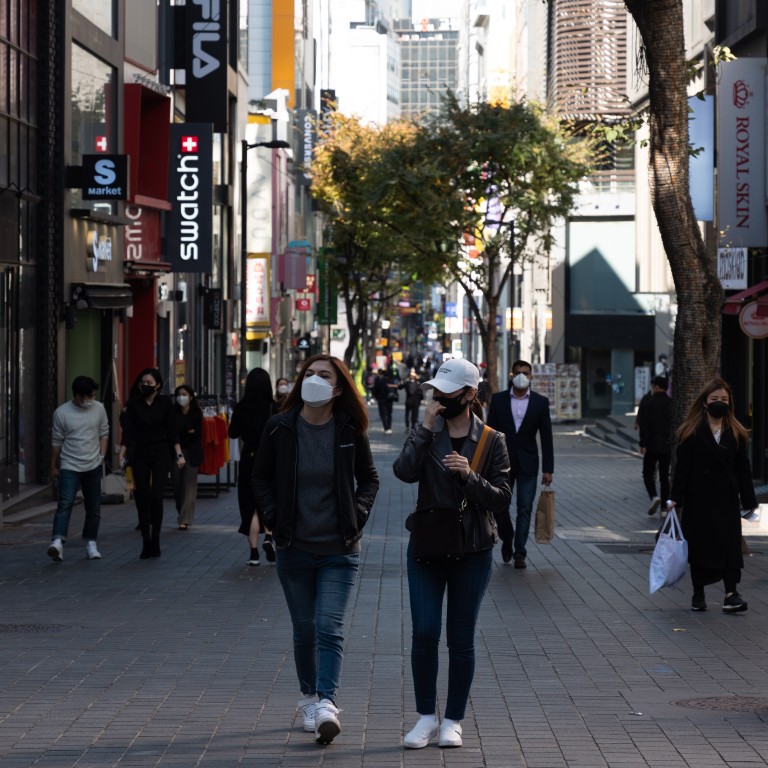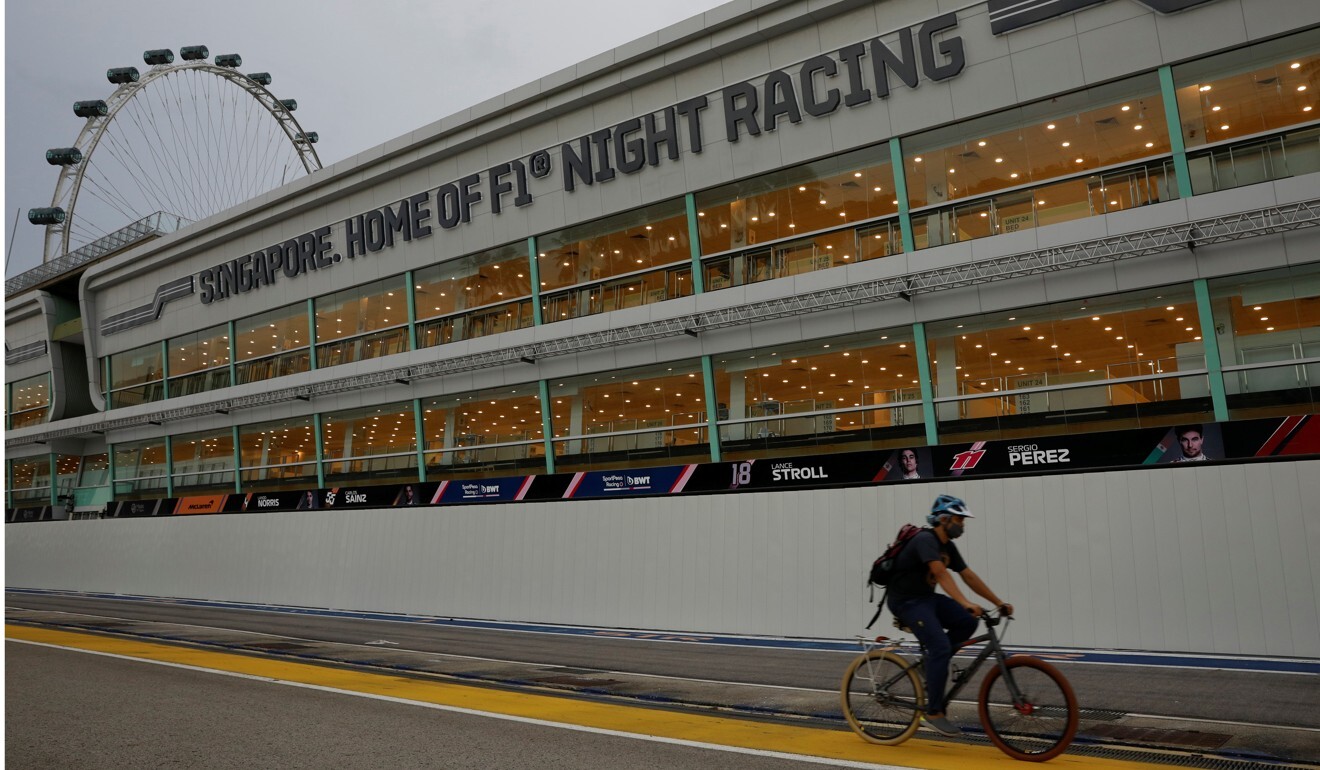
South Korea eases curbs as it tries to ‘live with Covid-19’
- A vaccine passport will be implemented and restrictions on restaurants and cafes will be eased from November 1, despite high daily coronavirus cases
- Elsewhere, Singapore’s daily Covid-19 count has fallen back to its baseline after a recent surge, as it turns its Formula One venue into a ward for patients
The first phase will go into effect on Monday and last for a month, officials said, with plans calling for all restrictions to be scrapped by February.
“Beginning November 1, our community will take the first step of resuming our normal life,” Prime Minister Kim Boo-kyum said at a televised government meeting. “However, we must be aware that this doesn’t mean the fight against coronavirus is over, but a new beginning.”
The push comes as South Korea still grapples with high daily case numbers, though they remain far below many of the worst hit countries, and serious infections and deaths are low.
Last week, South Korea met its goal of vaccinating 70 per cent of its 52 million people, paving the way for the planned return to normal. It has now fully vaccinated about 72 per cent of its people, and given at least one dose to more than 79.8 per cent.
While never under lockdown, South Korea has been battling the fourth wave of infections since July when the government imposed tight gatherings and social distancing restrictions.
Outdoor sports events will be allowed to take up to 50 per cent of spectators and up to 100 people can attend musicals or concerts regardless of vaccination status. Inoculated people will be allowed to consume popcorn and soda inside cinemas. Visits to high-risk venues such as bars and night clubs, indoor gyms, saunas and karaoke bars will require proof of vaccination, or a negative Covid-19 test result from within 48 hours.
South Korea launches panel to debate strategy on living with Covid-19
South Korea has launched its own vaccine app that it says protects user privacy through blockchain technology.
While private gatherings will be allowed with up to 10 people nationwide regardless of vaccination status, but restaurants and cafes will keep a cap on up to four unvaccinated people per group.
Authorities have said they will focus on hospitalisation and mortality rates rather than daily mitigation and expand self-treatment for those with only mild Covid-19 symptoms.
The Korean Medical Association (KMA) and experts have warned that the timing of the switch to the new strategy may fuel a rise in Covid-19.
South Korea reported 2,124 new cases for Thursday, bringing its cumulative tally to 360,536 infections with 2,817 deaths.

Singapore surge eases, F1 venue turned into ward
A total of 4,248 new cases were recorded on Friday, along with 16 additional deaths, the health ministry said. The weekly infection growth rate is 1.13, and authorities have signalled they want to see this fall below 1 before they can ease domestic social curbs further.
Daily infections had surged above 5,000 for the first time on October 27 due to an unusual spike in cases confirmed within a few hours, prompting authorities to say they were investigating the surge and would monitor trends over the next few days.
Singapore sees record 5,324 new coronavirus cases in ‘unusual surge’
Singapore has one of the highest vaccination rates in the world, allowing its government to open borders up with vaccinated travel lanes including to parts of Europe, Australia, Canada and the US. It is now trying to ease the strain on the health care system by maintaining domestic restrictions at least until late November, including limiting social gatherings to two people.
As of October 27, 84 per cent of Singapore’s population was fully vaccinated, and 14 per cent had received boosters.
Meanwhile, Singapore’s Formula One pit building, normally used for the high-profile Grand Prix motor races, is being converted into a medical facility for coronavirus patients, The Straits Times reported.
The Pit Building was used for swab tests last year and was identified as a suitable temporary venue for Covid-19 patients because it has ready facilities, said Ong Ling Lee, director of sports at the Singapore Tourism Board. The halls in the building, which have in the past been used for art fairs and other events, have been partitioned into sections for more than 600 beds, the paper said.
Australia's vaccination drive reaches Antarctica
Australia is gradually easing pandemic restrictions as it boosts vaccination levels after its southeast was rocked by a third wave of infections fuelled by the Delta variant.
Sydney and Melbourne, its largest cities, are readying to welcome fully vaccinated residents flying from overseas without quarantine from November 1 – the first time in over 18 months. Outbound travel ban will also be lifted then.
Pfizer-BioNTech vaccines for 27 staff at Australia’s Casey Station in Antarctica had arrived, Federal Environment Minister Sussan Ley said on Friday. Vaccines will also be delivered to its Davis and Mawson research stations.
Australia to lift international travel ban for citizens after 600 days
Australia has managed to keep its stations on the frozen continent free of the coronavirus, despite its arrival there last December when it became the last of the world’s continents to report an outbreak.
“As expeditioners prepare to head home, it is important that they can join the national surge in Covid-19 vaccinations,” Ley said in a statement.
The relaxation in travel rules, however, is not uniform across Australia, as states and territories have differing vaccination rates and health policies.
Victoria state, home to Melbourne, will ease more curbs later on Friday despite reporting its deadliest day of the Delta outbreak a day earlier and daily infections lingering near record levels. The state recorded 10 new deaths, down from 25 on Thursday. Cases dipped to 1,656 from 1,923.
Neighbouring New South Wales reported 268 new cases, the lowest rise in nearly two weeks.
Tonga records first ever case of Covid-19
The island, which lies about 2,300km north of New Zealand, closed its borders when the pandemic began and had previously never recorded a single case of Covid-19.
However, a passenger on a repatriation flight from Christchurch, in New Zealand’s South Island, had tested positive, Tu’i’onetoa said in a press conference.
The person, along with the 214 other passengers, had been isolated and quarantined since their arrival in Tonga on Wednesday.
Seasonal workers and some of Tonga’s Olympic team officials who got stuck in New Zealand on their way back from the Olympic Games in August were on the flight, local media reported. They had been denied permission to enter Tonga for weeks after Covid-19 cases were detected in New Zealand.
New Zealand sets 90 per cent jab target to ease curbs
Tu’i’onetoa asked Tongan residents to prepare for possible restrictions and get vaccinated. In Tonga, about 48 per cent of the country’s eligible population has received a first vaccine dose, while 31 per cent are fully vaccinated.
New Zealand’s Ministry of Health said in a statement they were investigating the Tongan case, and added that the person had returned a negative pre-departure test before leaving New Zealand.
Reporting by Reuters, Bloomberg, DPA
